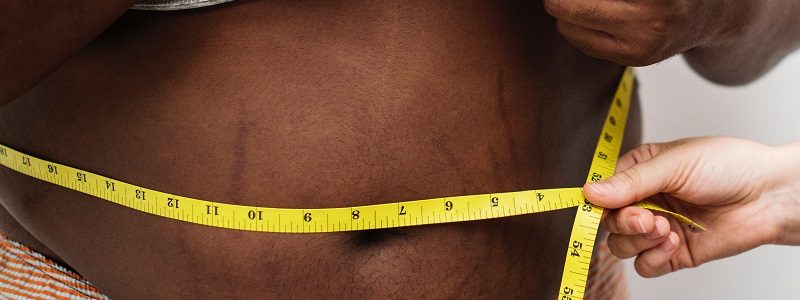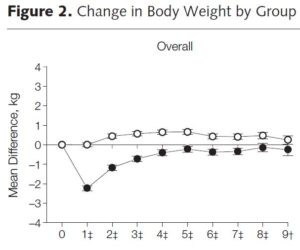This was the diet wisdom when I was growing up. If you are fat, then eat less and exercise more.
I know it intimately. I remember a time when I was in about fourth grade. I learned to count calories with a little booklet my Mom had. I made sure I rode my bike more outside. I wanted to lose weight, because I was told I was fat.
I did it: eat less, exercise more
I heard the word “willpower” applied to the process. It was all about restraining myself from eating.
It seemed logical while counting calories, that if I ate less calories and burned more, I should lose weight. It made sense what they told me about calories in and calories out.
Well, it did not work. I did not lose weight. I blamed myself. I felt that I could not do it well enough.
What I did not know at the time is that trying to burn more calories than you eat with exercise and calorie restriction for weight loss had no scientific evidence. There were no studies on it to prove that it works! Perhaps it was not being studied because being overweight was not such a big problem back then. There simply was not a large proportion of the population that was overweight in the 1960’s and ’70’s. The predominant thinking was to blame eating and not look any further.
A Landmark Study
That changed in 1997 with the results from the Women’s Health Initiative. This study followed 50,000 women and analyzed diet among many things. In that study, the intervention group of women were put on a low fat, high carbohydrate from vegetables, fruits and grains diet. They were told to reduce calories by about 342 a day, and increase exercise by 10%.
The researchers expected that that the women with the low fat, high carbohydrate diet would lose an average of 32 pounds a year with that kind of calorie deficit and increase in exercise. They did lose weight the first year to two, however gained it back in subsequent years. Were the researchers surprised seven years later when virtually no weight was lost!
The Women’s Health Initiative disproved that eating less calories and exercising more would result in weight loss long term.
We acknowledge today that weight is not consciously regulated. You cannot decide to eat less and exercise more and you will automatically lose weight. It doesn’t work that way. Today we have a bigger picture.
Hormones enter the picture
Weight is regulated by hormones, chemical messengers in the body.
Hormones regulate just about everything in the body and weight is not exception. There is a hormone, ghrelin, that tells us we are hungry. There are other hormones which signal that we are full and we simply cannot eat any more, even if it is Thanksgiving. There is the master hormone that regulates weight, and it is called insulin.
Insulin makes you fat.
Ask any type 2 diabetic that has had to go on insulin. They gain weight, and it can be a lot of weight using insulin.
On the other hand, type 1 diabetics don’t have enough insulin in their bodies, and one of the first symptoms of that disease is weight loss. Specifically, the symptom of weight loss despite eating a lot is a tip that there is not enough insulin to keep on the weight. That is a symptom of type 1 diabetes.
What stimulates insulin production?
It is not simply calories that stimulate the production of insulin. All calories are not created equal. A piece of chocolate cake with ice cream and a steak dinner are not equally metabolized even if they are the same amount of calories.
It is refined carbohydrates, like chocolate cake and ice cream, which stimulate the production of insulin.
Carbohydrates are composed of sugars, such as glucose, fructose and galactose. What we call sugar is a simple combination of two of these. Unrefined sugar is found in fruits, above-ground vegetables, and raw grains.
What we call starch is chains of these sugar components. We find unrefined starch in root vegetables and grains such as corn, rice and wheat.
Carbohydrates are found in nature in an unrefined state in those foods mentioned. However, refined carbohydrates proliferate in our food supply, and in most of our diets. Refined carbohydrates are the stimulators of insulin, and the culprits in weight gain because of the insulin.
This gives us our first clue as to how to successfully lose weight from fat. The answers are complex, and in most cases need to be individualized for you to successfully lose weight.
Exercise more?
Exercise is the other side of the equation that I am busting.
Don’t get me wrong, exercise has a multitude of health benefits. The benefits of exercise include increased strength, balance, improved blood pressure, and improved other blood markers. Exercise lifts the mood and has lasting benefits after the exercise session is over.This is shown in one meta-analysis in the Canadian Medical Association Journal.
On the other hand, lack of exercise is a better predictor of death than smoking or high blood pressure, according to a 2011 study by O’Gorman and Krook. In fact, physical inactivity is an independent risk factor in more than 25 chronic diseases, according to a 2005 study in Applied Physiology. Additionally, exercise does not have to decrease body weight to benefit our health, says the clinical experience of Dr. Jason Fong, an expert in diabetes and obesity.
However, our “eat less, exercise more” equation is asking for more exercise. There are several problems with this. The first problem is that exercise stimulates appetite, and people tend to eat the calories that they burn during the exercise. This was shown in a study published in Obesity Review in 2012.
We conclude that the small magnitude of weight loss observed from the majority of evaluated exercise intervention studies is primarily due to low doses of prescribed exercise energy expenditures compounded by a concomitant increase in caloric intake. – Obesity Review
Another study with postmenopausal women who were previously sedentary shows that they compensate for calories burned during more exercise with eating more.
We confirmed the findings of previous studies that a relatively high dose of exercise (12 KKW or 194 minutes per week) results in compensatory mechanisms that attenuate weight loss in previously sedentary women. – PLoS One, 2009
Another issue with increased exercise is that we tend to balance exercise and non-exercise activity so that the total stays the same. This is well described in studies showing that doing a specific exercise regime results in being less active during the day. One study with overweight adolescents showed this as well as another study.
Let’s not exercise
In addition, although everybody has heard the glowing benefits of exercise, few actually will do it if they don’t want to. Some reasons can be that they are too heavy and have a difficult time, they have joint pain, nerve pain, or back pain, or even heart disease.
Perhaps the biggest reason “exercise more” is left undone is that we do not see any visible results!
The fat was not primarily caused by not enough exercise. If you are not addressing the cause, then you will not get the result you are looking for.
Then, what is the solution?
If the solution to weight loss is not eat less, exercise more, then what is it?
There was a huge clue with the hormone piece. Refined carbohydrates are the stimulators of insulin release. Insulin is the hormone that, when in excess, causes us to gain weight. When it is in excess it prohibits us from losing weight. We know the solution has something to do with refined carbohydrates. But is that the whole picture?
Knowing the complexities of our bodies, it may not be that simple. Stay tuned for more on restoring our bodies to lean machines in future blogs.
In the meantime, please comment below about your experience with eat less, exercise more disappointments. Perhaps you have found an alternative that works with your body. Please let us know.






